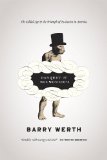Summary | Excerpt | Reviews | Beyond the Book | Readalikes | Genres & Themes | Author Bio
Great Minds, the Gilded Age, and the Triumph of Evolution in America
by Barry Werth

Critics' Opinion:
Readers' Opinion:
First Published:
Jan 2009, 400 pages
Paperback:
Apr 2011, 400 pages
 Book Reviewed by:
Book Reviewed by:
Micah Gell-Redman
Buy This Book
Spencer held that societies are organisms and that, like living forms,
they evolve. He asserted a gradual evolution from primitive, less organized,
to advanced, more organized, societies; and he maintained that as
societies become more complex, and individual roles (and property) more
varied, government must retreat from vast areas of social life so as to allow
each individual to rise by his own exertions. Noting that Spencer compared
the role of Parliament to that of the "cerebral masses in a vertebrate
animal," Huxley applauded Spencer for the biological analogy, but criticized
his conclusion that just as the brain "averages the interests of life,
physical, intellectual, moral, social," the appropriate sphere of government
is to average the interests of various classes in society, not to do anything
to improve or alter their relations. Huxley wrote:
All this appears to be very just. But if the resemblance between the
body physiological and body politic are any indication, not only of
what the latter is, but of what it ought to be, and what it is tending to
become, I cannot but think that the real force of the analogy is totally
opposed to the negative view of State function.
Suppose that, in accordance with this view, each muscle were to
maintain that the nervous system had no right to interfere with its
contraction, except to prevent it from hindering the contraction of
another muscle; or each gland, that it had the right to secrete, so long
as its secretion interfered with no other; suppose every separate cell
left free to follow its own "interest," and laissez-faire lord of all, what
would become of the body physiological?
In Paris, Spencer bristled for three days while Youmans coped with
"my embarrassments here - short time, nobody at home, difficulty of interpretation,
torments with cab-drivers, etc." Spencer sought unsuccessfully,
in scrambled French, to find a secretary, until one night Youmans
finally offered to take dictation. "Spencer couldn’t stand it," Youmans told
Catherine in a letter, "so he said, ‘Huxley has been rampaging around long
enough; he must be pulled up.’ I wrote twenty pages of manuscript." Polishing
the reply upon his return to London, Spencer pushed to have it
appear in the next Fortnightly Review, explaining his urgency in his
autobiography: "[Huxley] put his objection in the form of a question. I
could scarcely avoid giving an answer; for otherwise the implication
would have been that the question was unanswerable."
While Spencer settled scores, Youmans traveled by train to Cologne,
then to Berlin, birthplace and capital of the triumphal new German empire.
Increasingly confident that the international series would get off the
ground - he had English and French publishers in tow, and a roster of famous
authors including ten of the "ablest men in France," as well as
Spencer, who succumbed to Youmans’s pressure to write a short extra
book on sociology - he nonetheless encountered strong opposition at first
to the scheme. "Germany is not going to suit me," he cautioned Catherine,
who assisted him in business, a well-regarded scientific author in her
own right:
They are too cocky. "We don’t want your translations; we can make our own books; the talent is here," is the way the publishers talk. On the ot
Excerpted from Banquet at Delmonico's by Barry Werth. Copyright © 2009 by Barry Werth. Excerpted by permission of Random House, a division of Random House, Inc. All rights reserved. No part of this excerpt may be reproduced or reprinted without permission in writing from the publisher.





The Funeral Cryer by Wenyan Lu
Debut novelist Wenyan Lu brings us this witty yet profound story about one woman's midlife reawakening in contemporary rural China.
Your guide toexceptional books
BookBrowse seeks out and recommends the best in contemporary fiction and nonfiction—books that not only engage and entertain but also deepen our understanding of ourselves and the world around us.